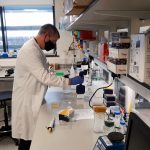Two new drugs to tackle superbugs that “will save many lives” are on the verge of being available to NHS patients.
Antimicrobial drugs cefiderocol and ceftazidime-avibactam are designed for patients with severe drug-resistant infections who would otherwise have limited or no other treatment options.
Their development comes as part of an NHS subscription payment scheme to encourage pharmaceutical firms to develop medicines to tackle superbugs.
Health Secretary Sajid Javid said antimicrobial resistance is “one of the biggest health threats facing the world”.
He added: “I’m incredibly proud that the UK’s world-leading innovations are helping to develop two antibiotics which will save many lives.
“NHS patients with severe resistance to other drugs could soon access these medicines, giving them a much greater chance of survival.”
More than 1.2 million people died from drug-resistant infections in 2019, according to a study.
More than third of cancer patients in England, Wales and Scotland diagnosed in A&E, study shows
Nottingham: Families criticise review into baby deaths and failures at NHS maternity units
Hepatitis: Parents warned to check for signs after ‘unusual’ spike in liver condition in under-10s
Strict controls on use of antimicrobials to slow development of resistance
The new subscription-style payment model is part of a project with NHS England and NHS Improvement and the Department of Health and Social Care (DHSC) designed to try to address the lack of new antimicrobials being developed and the growing threat posed by antimicrobial resistance, the National Institute for Health and Care Excellence (Nice) said.
In 2020, only 41 new antimicrobials were being tested in clinical trials compared with about 1,800 immuno-oncology drugs, Nice said.
New antimicrobials, particularly those targeting multi-drug-resistant pathogens known as “superbugs”, are subject to strict controls to restrict their use to slow the development of resistance.
UK ‘cannot address the global threat of antimicrobial resistance alone’
Nick Crabb, programme director in Nice’s science, evidence and analytics directorate, said the draft guidance on the two new drugs represented an “important milestone” in the UK project.
He added: “Its ultimate goal is to ensure the NHS has access to effective new antimicrobials to call on when needed and patients aren’t left without treatment options in the face of growing antimicrobial resistance.
“But we cannot address the global threat of antimicrobial resistance alone, since the UK represents only about 3% of the global market for antimicrobials.”






















